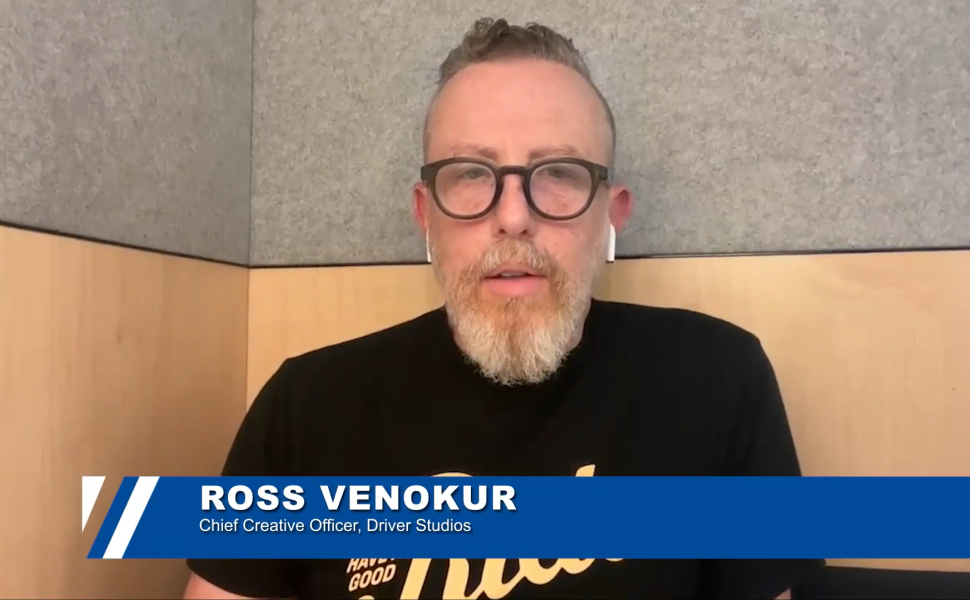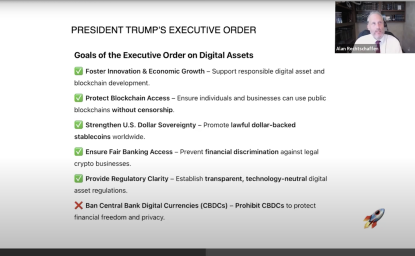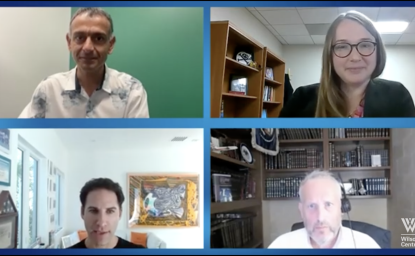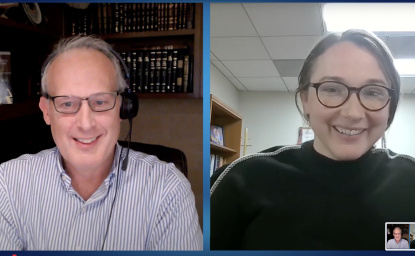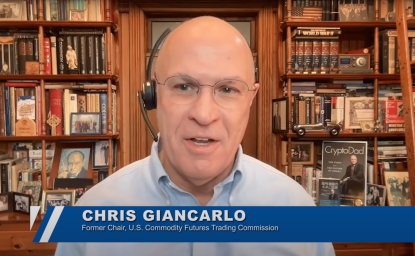Narrator: Welcome to Blockchain Explained, a podcast about opportunities, challenges, and trends in blockchain technology. Whether you're a beginner or an expert, a developer or just crypto-curious, this podcast is for you. It features industry leaders and government officials discussing the world of distributed ledgers, cryptocurrencies, and the metaverse. And now, here are your hosts, Alan Rechtschaffen and Kellee Wicker.
Alan Rechtschaffen: Hello, and welcome back to Blockchain Explained. I'm here with my co-host Kellee and we are very, very excited today to welcome Ross Venokur. And the reason I'm so excited—and Kellee can tell you a little bit about her impressions of having talked to Ross a little bit—but the reason I'm so excited is because Ross is somebody who I've become friendly with over the years, and he's one of the people who makes me cool to be friends with because he's, like, a movie director, and he does all this fun stuff in animation and all these cool things which makes me (I guess?) by association somewhat cool. In fact my daughters love one of the movies that he did which was called Charming which was about how Prince Charming was the same person in every one of the fairy tales. So, very creative stuff and he just did another movie called Rally Road Racers and he's one of the cool Hollywood people in my, in my orbit. As a professor, it's sometimes hard to be able to say that you have cool friends. All that said, Ross and I spent a little bit of time—he consulted me and asked me some questions about an NFT he worked on, which was exciting. And he's gotten very much involved after he talked to me about this NFT that he was working on, which was his first NFT in the NFT world. And I, you know, Kellee, I'll turn it over to you to open it up with Ross, but I just wanted to give that introduction because I have a personal affinity for Ross. So, with that, I'll turn it back to you, Kellee.
Kellee Wicker: No, yeah, it's exciting to have you, Ross. Welcome. Like Alan said, you're a writer, you're a director, you're an artist. And I know, I've heard you talk a little bit about the difficulty that creatives face in wanting to own and steer their own work, which is a theme that we hear a lot, especially now that AI has come into full force with generation. And there's a lot of questions about, “OK, who owns your style? Who owns the things you make?” But this is not a new topic. So how do you see blockchain contributing to a solution where creatives can own their own work?
Ross Venokur: Well, I guess, I mean, not to sound too much like someone who's fully drunk to Kool -Aid, I think blockchain or Web3 will ultimately solve that problem and are already solving it. I mean, I think that the biggest problems Web2 creators face and have faced for years is lack of control and a lack of monetization options. So, you know, blockchain's already made these huge inroads as far as establishing ownership, rights management, independent funding, distribution. So there's so much stuff that I've been craving in my own life for years before blockchain came around, but there are obviously still problems. The biggest one to my mind is scalability limitations. Like how do you, it feels like everyone in the world of NFTs and blockchains is shouting into small echo chambers. And even a big success is a generative collection at 10,000 pieces that were probably bought by 3000 people. Like, that just doesn't compete with what's happening on a studio level of, like, releasing an Avengers movie, which is a global event. So we got to get over scalability limitations. I think we have some problems with the user experience, like how it's so intimidating and unfamiliar to the mass of the people that, you know, you bring up words like crypto and NFT and digital wallet. And I think we have to move all that to the back of house and stop talking about that stuff. And then of course, a big one is regulation uncertainty. It's scary to be creating in a place that's being regulated or they're figuring it out and wondering, wait, am I potentially breaking the law right now? Am I making a security and what is a security? I'm just a creative writer. I have no idea what securities are, like, but I'm hearing that I might be running afoul of the US government. I would love clarity around that. I think a lot of creatives would. And then of course the big new kid on the block, as you would imagine, is AI, you know, which is… that's much more of an existential thing in its nature, I think. And, you know, what does it mean to be a creator in a world where maybe creation in the future is just going to be prompt driven? And I don't have an answer to that, but like I did with NFTs, I just jumped in because I'd rather be part of the solution than later on have a solution handed to me. So...
Alan Rechtschaffen: Yeah, I just want to interrupt you for one second because you were talking about sort of very, like, somebody who's very deep involved in NFTs, which you are, I was wondering if you could take our listeners, our viewers, through your, through your evolution through NFTs, so they could understand how the market has evolved, how the use cases have evolved. One of the things you said that, you know, people are afraid of NFTs because of the legal things, and there were all these stories about people doing bad things with NFTs and with cryptocurrency, and we had one of the business heads from Mattel on, and he was talking about how they don't use the word NFTs, they talk about collectibles because, because, of some of the history here. But if you could tell us a little bit about your history and how that mirrors the evolution of NFTs, I think that would be very helpful to people who are thinking about regulating this.
Ross Venokur: Sure, and the end of my story is also, I stopped using the word NFT too, but we'll get there. But basically, you know, like so many people, I just became aware overnight when Beeple sold art for $69 million, basically a collection of JPEGs. And I was like, I need to know about this. So my brother and I were talking about, how, the same thing that people still say to me, which I no longer think is true—that feels like a scam. Like that feels like we're selling someone the Brooklyn Bridge, the oldest scam in the world. So, we started having the idea that we should sell someone the Brooklyn Bridge and see what happens, just because we liked the satire of it all and we're comedy writers, you know, of 30 years each. So, we came up with the idea that we were gonna sell a piece of art by the Brooklyn Bridge and we thought the perfect person to sell it was John Cleese, who had been at the time in two of my films and was just recording, could be in a third. So I reached out to him, it was the middle of the pandemic thinking I'll never hear back from him. Five minutes later, I got an email back saying, “hey, I'm in Arizona," and I happened to live in California at the time. He's like, “come out here, we'll do it. I want to make $69 million.” So, flew out to Arizona for the weekend. He was staying in a random house with his daughter and some other people, and John painted the Brooklyn Bridge, and we decided to mint it on Ethereum and create an auction. And we literally had no idea what we were doing. We made every possible mistake we could make. We were burning gas fees, spending thousands of dollars. The auction was two weeks and it should have been three days or a day. You know, we just, we were just finding our way through it. At the end of the, we did not make $69 million. We sold it for a little over $50,000 to a guy who had an unfortunate screen name. And that was that. But I was bitten. Like, the fire was lit inside of me because I had spent so much time—you had mentioned me as a Hollywood person, but about 15 years ago, I got out of Hollywood. I went, like, Hollywood adjacent. I went independent because I was craving ownership of my own material. I wanted to, like, make my own product and own them at the end of the day. I wanted to stop making other people really rich and just being like, that was my thing, but I guess I don't own it anymore. I was always working for hire on my own projects. So I realized, wait, we had just basically sold the JPEG for $50,000, you know? And if I'm gonna make independent animation and it's 24 frames per second and 30 minutes of, you know, 60 seconds in a minute, 30 minutes of a Christmas special that I was trying to do. Well, that's 42 ,000 JPEGs I'm making. Why don't I just pre-sell? People love collecting digital art. Why don't I make the first movie ever financed one frame at a time? I'm going to pre-sell the digital frames of my art. And I want it to be mainstream. My whole thing is the family audience, which is the biggest audience in the world. So I reached out to some people I was doing other business with, the band Walk Off the Earth. They're like a huge band that sell out concerts in 50 countries. They're family friendly. And I said, you want to do this thing together? And so we went down the road and launched this thing. And we basically just missed the NFT craze. Three months earlier, anyone could sell anything. We launched 1,224 “ornamints,” as we called them, our little clever name, on Christmas Eve. And we didn't hit our target at all. The project's still alive, but what we realized in unpacking it over the next year was they had a huge audience who loves everything they do. We ostracized their audience. We were talking about NFTs and technology and all this stuff that was scary, no one wanted to hear about. We should have been saying, “hey, do you love making—do you love animation? Do you love Christmas specials? Do you love Walk Off the Earth? Come join us. We're going to make something together. And we overburdened everyone with this word, NFT, which has become a bad word. And no one wants to hear about it. The word fungible is so, and non-fungible, so unappealing and confusing. And so I think we, you know, where I am now, we're still, that film is still being made. We've launched other projects, but it's really about, can we meet people where they are? Let's stop trying to drag people over the bridge to Web3. Why don't we walk back over to Web2 and say, we're just doing what you love in a different way, but it doesn't matter how we're doing it. Let's just join us. Have fun.
Kellee Wicker: I love that, and before we started the recording, I was talking about, I'm excited about this episode because you do have this, like, fun idea of the technology. It's not just this abstract thing, but talking about that bridge between Web2 and Web3, what is the biggest obstacle to us walking that bridge successfully?
Alan Rechtschaffen: Yeah, I'll add to that, Kellee, you know, Kellee can tell you that this is a theme that comes up on every episode, is that we talk about the fact that, look, all we have to do is figure out how to get people to adopt this. And once they adopt it, everybody's going to want to do it. But it's really interesting the way you're approaching it saying “adopt” is an adopted technology. It's sort of just seamlessly integrating it or something. But I would love to hear what you have to say.
Ross Venokur: Yeah. I mean, I'll tell you a story which, it sort of, it came to me. I was a speaker at NYC two or three years ago. And while someone asked me a question like this and the answers kind of came out of me, I wasn't prepared for it. But now it's my go-to point, which is if you take your kids to Disney world and you say, “hey, come on, let's go on space mountain. It's a roller coaster in the dark. It's going to be awesome,” you don't get them to the front of the line and go, “hey, before you go on this ride, you need to do two years of mechanical engineering and studying and you've got to learn physics.” You just put them on the ride. And if they love it, you go again. And if you want your kids loves it so much that they want to know “how does it work? Why don't I follow up the track?” Well, now you have an opening to start. Maybe your child is a mechanical engineer, but most people just want to ride the ride and have a really good time. So, I think that, that to me is the biggest, the biggest problems. And, I think the question was, the barriers to moving forward is that, one is misinformation. I think that Web2 media has a bias against Web3. They, they don't like it. We're not being helped by real-world problems like FTX and all that kind of stuff which then puts everything in this basket of corruption and scammer, and all that kind of stuff. And the other one is how the NFT community came out the gate, myself included. We were all so excited about mechanical engineering. We forgot to tell people about the fun ride. Nobody cares. Meet them where they are. And, so, I used to spend a lot of time and my partner on a lot of stuff, Joel Cassidy, the drummer from Lock Up the Earth, who's very in the space. We spend a lot of time saying, like, how do we get Web2 over the bridge to Web3? What we've realized is we need to walk back over the bridge to Web2 and, and, you know, bring our basket of goodies with us. It's not about bringing anyone. It's like meeting them and going, we're going to enrich the things you love. You love—you're interested in animation. You love this band. You love—now you can be part of it. And, and, and it's just fun. And by the way, if you're interested and your kid is geeking out or something, yeah, there are these tokens you can buy that have all these other real world uses. You can be part of the movie, you can help the script, you can be active in the community, you can be passive in the community. The other thing I just want to say that I think is a problem is for whatever reason, everyone decided that the place NFT communities were going to meet is Discord. And I can't stand Discord, is, like the worst, worst. like, UI ever. It's like a bad 80s movie hacker scene. I just, it's so alienating to people and so many people who I had excited about doing something with us on the HolidayVerse would get to Discord and then I hear from that guy, “I opened Discord and I walked away.” I just think we have to be like I said, just meet people there. Nobody wants to decode all this stuff. They just want to have-
Alan Rechtschaffen: You know what else, it's really interesting what you describe. If you think about the evolution of computers, it was kind of like that. Because I remember when, when you had to fix something on your old PC, and you had to go into like this code, and say all this stuff, and talk to the tech desk, and you had no idea what was going on, and all of a sudden somehow Apple figured out how to make it totally user friendly and it evolved the, and you're describing a similar need for evolution in the blockchain space. So it's a seamless integration and it's totally user friendly.
Ross Venokur: Exactly. I mean, think about-
Kellee Wicker: Can I ask a question on that?
Ross Venokur: Go ahead.
Kellee Wicker: Oh, no, go ahead Russ.
Ross Venokur: I was just going to say, think about when the internet came around. We didn't try to teach everyone what the internet was. I mean, Jeff Bezos showed up and said, hey, you want to buy a book for cheaper than you currently buy it? I was like, yeah, I like books. I don't like spending a lot of money. And then the internet grew underneath that. But we never had to get a lesson in the internet.
Alan Rechtschaffen: I'm totally not authorized to do this, Ross, but I think that we should have Walk Off the Earth come to the Wilson Center, perform, and have a fun presentation of what you can do with this technology without knowing that you're using this technology. That might be the way to have the regulators understand that this is fun and not just annoying.
Ross Venokur: Well, I'm not authorized to do this here, but I will speak to him about it. But let me say, speaking of fun, one of the great things, I mean, it's been a slow moving but very dedicated and small community around the HolidayVerse. But one cool use case of the, if you own an “ornamint,” Walk Off the Earth, if you have an “ornamint” in your wallet, for life, you and a guest can get guest listed on any live Walk Off the Earth show in the world. I mean, how cool is that? You bought like an “ornamint”, like, they're playing, I'm gonna go and show them this thing and you get to come into the show. You don't have to buy the tickets. I mean, I don't know. To me, that's awesome.
Kellee Wicker: That's crazy. I want to like, so on this question though of like, cause I think it's true. You mentioned this, like it's hard to get involved with crypto, with NFTs. There's, it's, it's a lot of times it's very confusing and you've heard all of this bad press sometimes. But, I hear a lot of people talk about, it's like, they talk about it in a binary way of like, you can either make it easier to use and centralize it in the process, which loses some of what makes this technology special, or you can keep it decentralized and it's impossible to use it without spending all your time learning how. Like, do you think, is that actually a trade-off or is there a way we can have both?
Ross Venokur: To me, I think we can have both. I think the—you know, I'm, like, so many people came to this space. Like, I love all the underlying ethos of, like, freedom, decentralization, like, toppling the system. Like, that's fun and exciting. You want to be part of that. That's historically been where the, the biggest moments of growth in society have happened. I just think it's a user interface problem. Like again, we, it's, it's very cool that everything is decentralized and there's so many benefits to it. But again, you don't, to Alan's point, I don't know how my Apple computer works, but I use it all day every day and it's doing what I need it to do. So I think, I don't see why you can't have both, but I do think, like I said about Discord, we've got a UI issue. Just make it, make it feel familiar to people, and then let it evolve, but don't ask them to, like, throw away everything they know. And also we're just butting up against insecurities, right? Because all these things are tied together. People think NFTs are blockchain, are crypto, are Web3. They're actually all different things. And crypto is this existential threat to people. Like, you want to take away my money? I mean, you can't get people over so many things at the same time. That's why I just keep coming back to this message of stop, stop screaming into the echo chamber, stop talking to the tiny minority of us who are excited about it and turn around and, just, start giving some uses and some value to people and they'll, they'll slowly come and meet you.
Alan Rechtschaffen: Well, Ross, it's great having you on the show. It's really, and I mean that you should ask them if they would do it. I think it would be fun to have a congressional-
Kellee Wicker: Alan wants a free concert.
Alan Rechtschaffen: -WOTE concert. Do people call them WOTE?
Ross Venokur: Well, yeah, their fans are the WOTElings, yeah.
Alan Rechtschaffen: Yeah. So, you know, because of knowing you, I've become sort of a fan of theirs and really fun YouTube videos. And it's really a pleasure to have you and really refreshing. And Kellee, you know, I think Kellee asked the right questions and I do wonder how much people care about the technology, how much people care about the question of decentralization anymore. I think the original founders of cryptocurrency like Satoshi Nakamoto, and the early stages really cared about the concept of decentralization. I wonder, I'm not saying that they don't, how much people care when they can actually do fun things with it, even if they have to integrate Web2 technology.
Ross Venokur: Yeah, I don't know. I don't know how much people care. I suspect not as much as the people, the creators care. So I think the way it ends up playing out is: creators come to the space and they realize, I can be protected here. I can, you know, I think about this one person all the time and this person, I don't know who this person is, if it's a man or woman, the person who drew the first sketch of the minions. I'm thinking of those words like that person probably got paid between $750 and $2500 for that week of work, right? Because they're probably a whatever level artist they were on the project. What does Universal made on that sketch? $2 billion, $3 billion? I guarantee you that person never got a royalty check. So then I think about the people who are driving the creative of the things we love, the SpongeBob toys we buy, all this stuff. All these people are coming into this space now going, wait, I can create something at the end of the day. Not only will I own it, all the people who supported me own it and they're all gonna profit. If I profit, we all profit together. I love these kinds of concepts. The general mass of people won't ever do that, but they're gonna start getting, like, really fun, good content served up to them. Thanks to, hopefully, ultimately we're gonna crack the distribution issue with the blockchain. But in the meantime, YouTube is pretty powerful. And, so, I think that your, your average person won't realize all the benefits they're getting, at least in this space. But when there's suddenly all these new shows that are YouTube only, and we know that 85 % of kids are consuming their content on YouTube, well now we don't have all these filters. You don't have to go in and pitch for six years, and you don't have to have everything be watered down by executives and studios and networks. So there is a benefit to people who like this brand of comedy or this, you know, and I think that's what Patreon has become. It's been a direct relationship between artists and their audiences, and then they can vibe off each other and be in communication. And I witnessed it firsthand. Like I said, HolidayVerse has been plagued with issues. We're still fighting to get it done all the time. But in this community, people who love Walk of the Earth, they spend time talking directly to Walk of the Earth. We're on, you know, we've paused for a while, but initially we were on monthly updates and you come on a big Zoom call or Discord meeting and there's the band. They're talking to you. They're telling you what's up. You have an opportunity to be in the movie with them. It's just, I think it's, I think these sort of new experiences will be exciting to people and whether or not they ever realize they've had anything to do with Web3 doesn't really matter.
Kellee Wicker: Russ, we're coming to the end of our time, but I do like to always ask one last question. What's the most exciting thing you see ahead in the development of these technologies?
Ross Venokur: I mean, to be honest, the exciting part is the same stuff that I got into it for, you know, I love that to, I love the ability to, like, overthrow giant pointless institutions and democratize the entire field. I, you know, it feels like, it just feels like there's so much promise here. And so I'm, I'm most excited about the same things I was at the beginning, decentralized content creation and funding of, of your own projects by, you know, through your community. Direct rights management and ownership, owning the things you make. It's super exciting to me. Building community and having these IRL experiences, you know, like you, hey, you're in our community, come to the Walk Off the Earth concert. You're, you know, I see this in other communities I'm in where we, you know, you meet up somewhere and you all have dinner. It's just, I mean, I love the idea of using technology to drive an actual real world experience because I'm not someone who wants to see a world where we all live with Apple goggles and we're walking around or not walking around. I feel blessed to be part of this world. I love the idea that we can use this technology to drive people back into the world instead of onto their computers. And so that and the other ones are decentralized distribution, like I mentioned. Like, I'm really excited for a moment where we figure out how to do a global release of something the way the Warner Brothers has always been able to do. So, and then, of course, going back to the person who drew the minions, the day that someone creates the first Web3 minions and we see that person and that person's community receive the billion dollars instead of some corporation that really, you know, obviously had an important role in it, but were not the creators of it. So...
Kellee Wicker: Well, thanks so much, Ross. It's been really great to hear the creative perspective on what these technologies could mean for people. I appreciate your time. Alan, as always, it's lovely to see you and co-host this show with you. And we'll see you on the next episode of Blockchain Explained.
Ross Venokur: Thank you guys so much, it's such a pleasure to be here.
Narrator: Thanks for listening to another episode of Blockchain Explained. Please note, nothing in this podcast should be construed as investment advice. Want more clear-eyed analysis of this exciting technology? Search for Digital Assets Forum at the Wilson Center for research, event recordings, and more. Want to ask our hosts a question? Write to STIP, S-T-I-P, at wilsoncenter.org (stip@wilsoncenter.org) with your thoughts. Thanks again, and we'll see you next time on Blockchain Explained!

